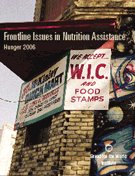 In the Summer-Fall of 2005, 158 members of the House of Representatives and 41 members of the Senate signed on to the Hunger-Free Communities Act (HR2717 and S1120). The bipartisan list included Reps. Heather Wilson and Tom Udall and Sens. Jeff Bingaman and Pete Domenici of New Mexico.
In the Summer-Fall of 2005, 158 members of the House of Representatives and 41 members of the Senate signed on to the Hunger-Free Communities Act (HR2717 and S1120). The bipartisan list included Reps. Heather Wilson and Tom Udall and Sens. Jeff Bingaman and Pete Domenici of New Mexico. By signing this legislative initiative--promoted by Bread for the World and other groups--our elected representatives made a very important statement: That they agree that ending hunger should be a priority for our country. Indeed, the Hunger-Free Communities Act is very clear about its goals: To cut food insecurity in half in our country by 2010 and end hunger by 2015. The legislation is very much in keeping with the spirit of The UN Millennium Development Goals, which calls on the global community to reduce global poverty and hunger in half by 2015.
The commitment our elected representatives made will soon be put to a test when President George W. Bush's sends Congress his budget proposal for 2007. The Bush budget makes significant cuts to many of the programs required to help poor people in our country, moving our country in the opposite direction than was intended by the Hunger-Free Communities Act.
"The President’s FY 2007 budget proposals fall far short of the investments required to meet the health, education and nutrition needs of America’s vulnerable families, children and elderly. Some proposals actually would worsen the situation for them," says the Food Research and Action Center (FRAC), which put together a comprehensive analysis on the impact of the budget cuts on federal nutrition programs.
Among other things, said FRAC, the budget makes deep cuts in very effective programs like WIC, Food Stamps, the Commodity Supplemental Food Program (CSP), and the Commodity Food and Nutrition Program.
The proposed budget cuts have will have a very direct impact on our own state. According to the New Mexico Association of Food Banks, the budget proposal would eliminate the CSP altogether, cutting off an important source of nutrition assistance for more than 18,000 low-income mostly elderly New Mexicans.
Additionally, the changes proposed by the Bush government would have the effect of reducing the ability of our state government (and that of other states) to get food stamps to 300,000 people in working families with children which are low income but not receiving cash welfare.
There are some voices in the faith community already speaking against the Bush budget, which not only weakens the nutrition programs but also greatly increases spending on defense and cuts $1.35 trillion in taxes, primarily for the wealthier members of our society. "Mandatory spending cuts of between $35 billion and $50 billion... are meant to relieve a deficit spending situation, but when combined with $70 billion in proposed tax cuts, could actually add approximately $35 billion to the deficit," said Bishop Philip Hougen of the Southeastern Iowa Synod of the Evangelical Lutheran Church in America. "This action is morally questionable and fiscally irresponsible."The Hunger-Free Communities Act has started us on the right foot in the fight to end hunger. And if Congress renegs on its commitment made through S1120 and HR2717, this too would be "morally irresponsible."
[Note: The above picture is the cover of the Bread for the World Institute's 2006 Hunger Report, Frontline Issues in Nutrition Assistance]
